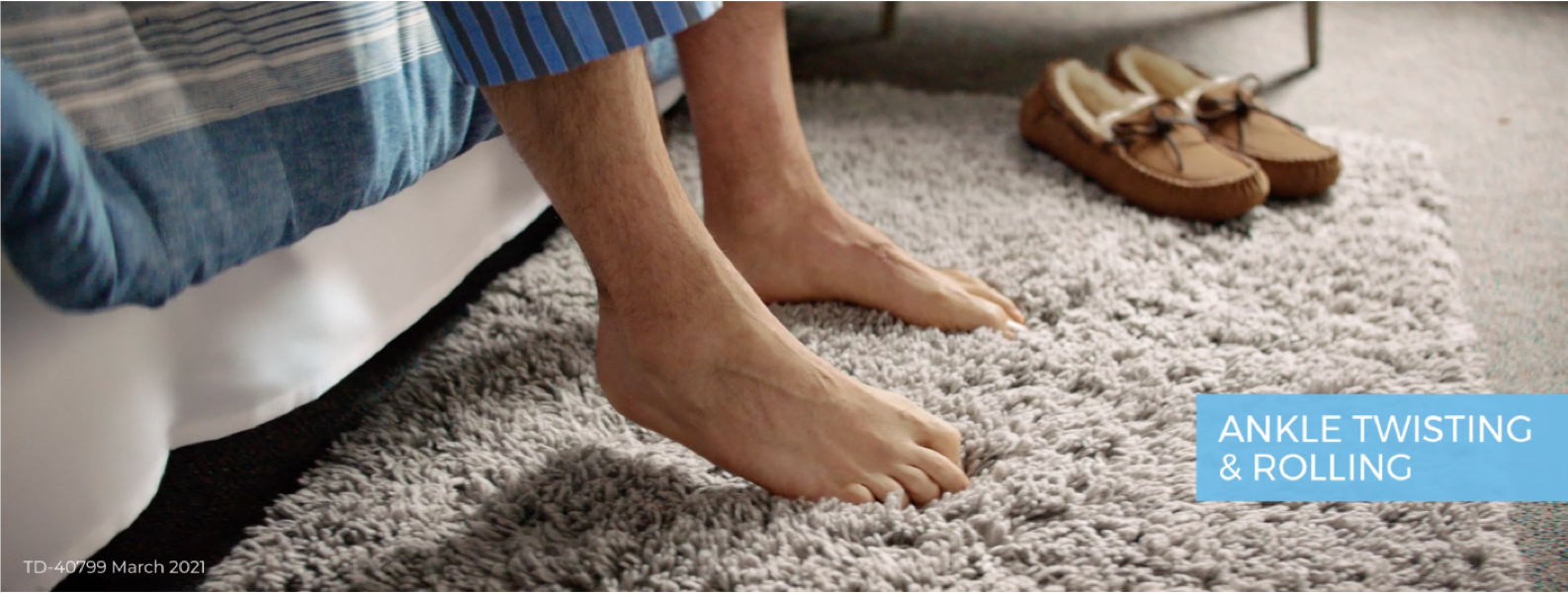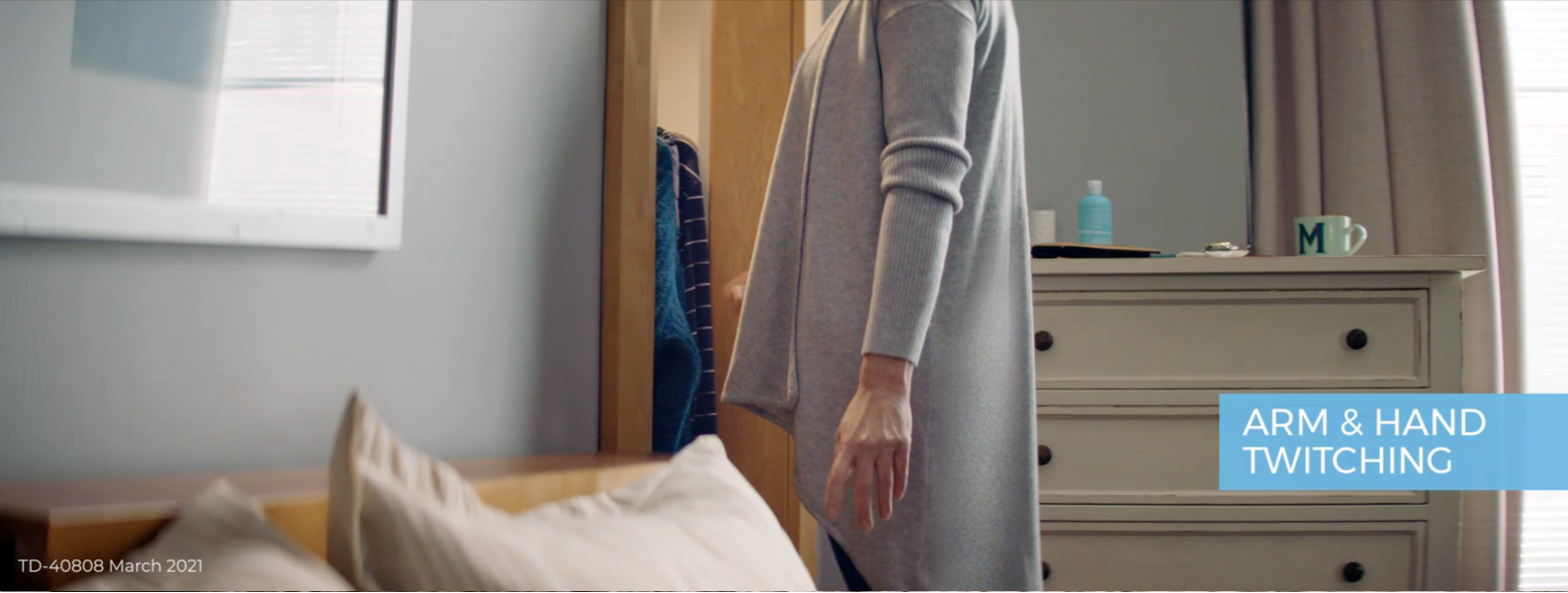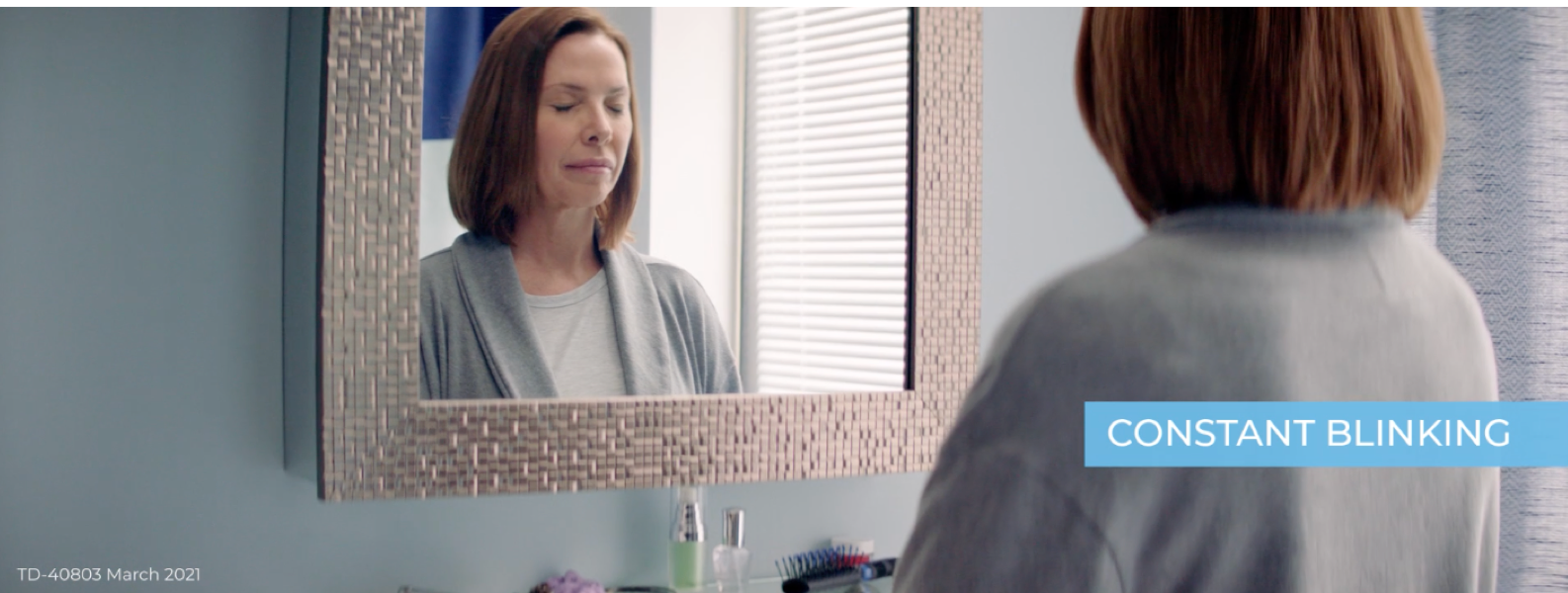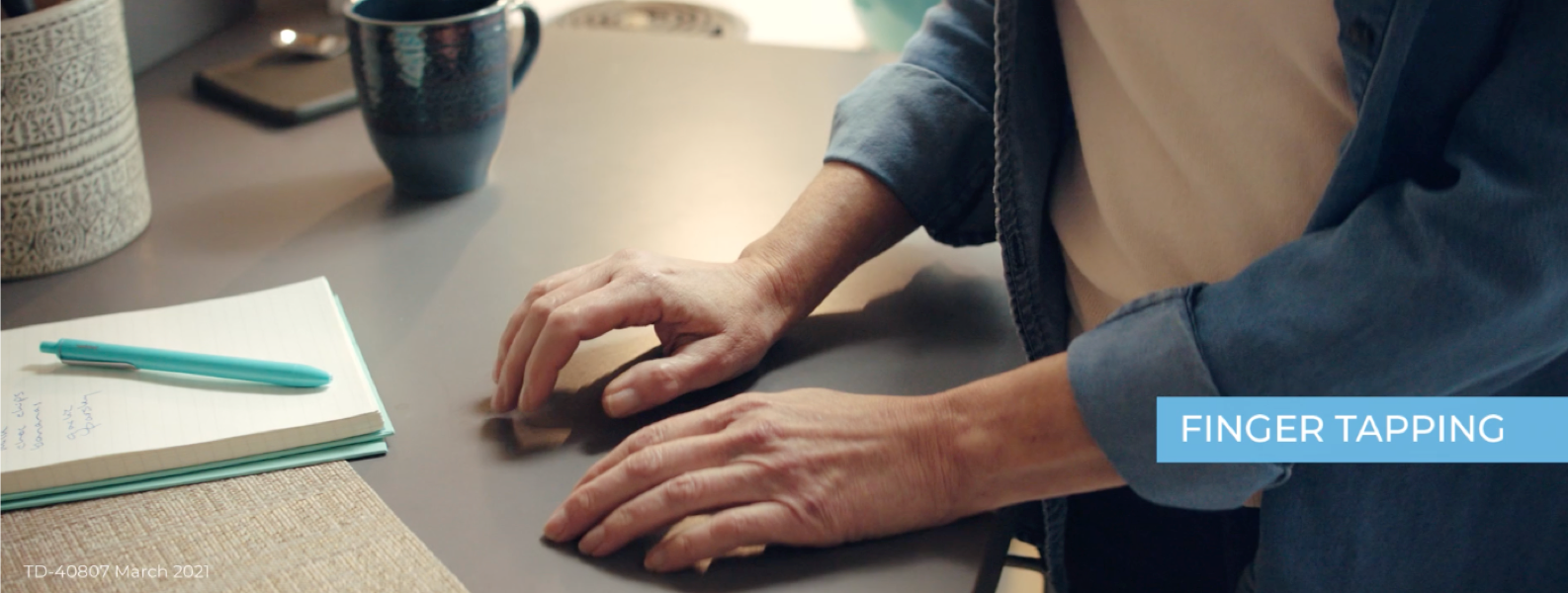Hear from real people with TD
Some people with TD recall not noticing their
movements until
family members
pointed them out.2,3,11
Voucher and NEW Patient Copay Assistance information is now available here
Once-daily AUSTEDO XR contains the same active ingredient as twice-daily AUSTEDO® (deutetrabenazine) tablets. Data on this page is based on twice-daily dosing.1
TD can:
Certain prescription medications used to treat mental health or gastrointestinal conditions can cause TD. It’s more than a side effect of these medications—it’s a real condition with its own diagnosis and treatment plan. It’s important to continue treating your mental health condition and also treat TD.
Healthcare providers don’t always see or ask about involuntary movements, which is why it’s important to share what
you’re experiencing during your appointment. Watch these videos to see what symptoms can look like.






See the symptoms2,3
No matter where you are with
treatment or diagnosis, we can
help you get the conversation
going with your healthcare provider.
Get patient support, treatment information, and downloadable
resources to stay on track with AUSTEDO XR.
Get more information about what to expect if you decide to treat
with AUSTEDO XR.
Having TD can be frustrating and overwhelming. In addition to the physical effects, TD may affect some people emotionally, too, by
causing embarrassment and social withdrawal.
Uncontrollable movements make it difficult to perform everyday tasks and activities and affect you in ways others may not see, such as
causing increased anxiety in social settings. This increased anxiety
may even make TD movements worse.
No clinical trials have been conducted to suggest treating TD affects these outcomes.
Now Playing:
Sherland's Story
See how Sherland took charge of her involuntary movements and regained hope since starting treatment for TD.
Video Transcript:
APPROVED USES
AUSTEDO® XR (deutetrabenazine) extended-release tablets and AUSTEDO® (deutetrabenazine) tablets are prescription medicines that are used to treat:
the involuntary movements (chorea) of Huntington’s disease. AUSTEDO XR and AUSTEDO do not cure the cause of the involuntary movements, and it does not treat other symptoms of Huntington’s disease, such as problems with thinking or emotions.
movements in the face, tongue, or other body parts that cannot be controlled (tardive dyskinesia).
It is not known if AUSTEDO XR and AUSTEDO are safe and effective in children.
IMPORTANT SAFETY INFORMATION
AUSTEDO XR and AUSTEDO can cause serious side effects in people with Huntington’s disease, including: depression, suicidal thoughts, or suicidal actions. Do not start taking AUSTEDO XR or AUSTEDO if you are depressed (have untreated depression or depression that is not well controlled by medicine) or have suicidal thoughts. Pay close attention to any changes, especially sudden changes, in mood, behaviors, thoughts or feelings. This is especially important when AUSTEDO XR or AUSTEDO is started and when the dose is changed. Call your healthcare provider right away if you become depressed, have unusual changes in mood or behavior, or have thoughts of suicide.
Individual results may vary.
Please see the Important Safety Information at the end of this video.
Once my involuntary movements were under control, I felt like I can live again. I can go outside again. I can be a part of the world again.
“Hello, my name is Sherland. I’m from Roxboro, North Carolina. I’m a published author. I edit novels. I am a great lover of literature and nature.”
Dear Sherland,
When this first started, you weren’t aware something was wrong… until your daughter asked why you were so fidgety. She told you that your mouth twitched when you talked and your fingers and feet constantly moved. When you realized you couldn’t control these movements, you grew self-conscious. TD transformed you from someone who loved conversing with strangers, to a timid individual who avoided family and friends because everyone asked when you had a stroke, not if you had a stroke, but when […]. TD left you feeling despondent and lonely.
My doctors told me that my involuntary movements…were side effects caused by my mental health medication. When I first found out that I had tardive dyskinesia, I did as much research as I could about it. It felt good to know that I had a name to put with what I was experiencing. And I felt like I wasn’t alone because other people were going through the same thing. The doctor told me when he recommended AUSTEDO, ‘I’ve heard of this treatment that I think might help you.’ AUSTEDO has allowed me to continue taking my mental health medication, because it’s really important. I suffer from major depression and bipolar. Before, I was just feeling hopeless. And after about two or three weeks I would say, I just started getting back out there because I had something to look forward to. I started seeing real progress with the involuntary movements. I have to say that it really made a difference in my life. I have confidence. I would tell them that there is a treatment, and it’s called AUSTEDO. And that you don’t have to feel hopeless like I did. You don’t have to struggle like I did. You can go to your doctor. You have a name, TD, to put with the symptoms. Ask about AUSTEDO and be proactive with your own health, because if you’re not, then who else will be? There’s no guarantees in life—but I feel like this is a good treatment plan for me.
APPROVED USE
AUSTEDO® XR (deutetrabenazine) extended-release tablets and AUSTEDO® (deutetrabenazine) tablets are prescription medicines that are used to treat:
the involuntary movements (chorea) of Huntington’s disease. AUSTEDO XR and AUSTEDO do not cure the cause of the involuntary movements, and it does not treat other symptoms of Huntington’s disease, such as problems with thinking or emotions.
movements in the face, tongue, or other body parts that cannot be controlled (tardive dyskinesia).
It is not known if AUSTEDO XR and AUSTEDO are safe and effective in children.
IMPORTANT SAFETY INFORMATION
AUSTEDO XR and AUSTEDO can cause serious side effects in people with Huntington’s disease, including: depression, suicidal thoughts, or suicidal actions. Do not start taking AUSTEDO XR or AUSTEDO if you are depressed (have untreated depression or depression that is not well controlled by medicine) or have suicidal thoughts. Pay close attention to any changes, especially sudden changes, in mood, behaviors, thoughts or feelings. This is especially important when AUSTEDO XR or AUSTEDO is started and when the dose is changed. Call your healthcare provider right away if you become depressed, have unusual changes in mood or behavior, or have thoughts of suicide.
Do not take AUSTEDO XR or AUSTEDO if you:
have Huntington’s disease and are depressed or have thoughts of suicide.
have liver problems.
are taking reserpine. Do not take medicines that contain reserpine with AUSTEDO XR or AUSTEDO. If your healthcare provider plans to switch you from taking reserpine to AUSTEDO XR or AUSTEDO, you must wait at least 20 days after your last dose of reserpine before you start taking AUSTEDO XR or AUSTEDO.
are taking a monoamine oxidase inhibitor (MAOI) medicine. Do not take an MAOI within 14 days after you stop taking AUSTEDO XR or AUSTEDO. Do not start AUSTEDO XR or AUSTEDO if you stopped taking an MAOI in the last 14 days. Ask your healthcare provider or pharmacist if you are not sure.
are taking tetrabenazine. If your healthcare provider plans to switch you from tetrabenazine to AUSTEDO XR or AUSTEDO, take your first dose of AUSTEDO XR or AUSTEDO on the day after your last dose of tetrabenazine.
are taking valbenazine.
Other possible serious side effects include:
Irregular heartbeat (QT prolongation). AUSTEDO XR and AUSTEDO increases your chance of having certain changes in the electrical activity in your heart. These changes can lead to a dangerous abnormal heartbeat. Taking AUSTEDO XR or AUSTEDO with certain medicines may increase this chance.
Neuroleptic Malignant Syndrome. Call your healthcare provider right away and go to the nearest emergency room if you develop these signs and symptoms that do not have another obvious cause: high fever, stiff muscles, problems thinking, very fast or uneven heartbeat, or increased sweating.
Restlessness. You may get a condition where you feel a strong urge to move. This is called akathisia.
Parkinsonism. Symptoms include: slight shaking, body stiffness, trouble moving, trouble keeping your balance, or falls.
Sleepiness (sedation) is a common side effect of AUSTEDO XR and AUSTEDO. While taking AUSTEDO XR or AUSTEDO, do not drive a car or operate dangerous machinery until you know how AUSTEDO XR or AUSTEDO affects you. Drinking alcohol and taking other drugs that may also cause sleepiness while you are taking AUSTEDO XR or AUSTEDO may increase any sleepiness caused by AUSTEDO XR and AUSTEDO.
The most common side effects of AUSTEDO in people with Huntington’s disease include sleepiness (sedation), diarrhea, tiredness, and dry mouth.
The most common side effects of AUSTEDO in people with tardive dyskinesia include inflammation of the nose and throat (nasopharyngitis) and problems sleeping (insomnia).
The most common side effects of AUSTEDO XR are expected to be similar to AUSTEDO in people with Huntington’s disease or tardive dyskinesia.
These are not all the possible side effects of AUSTEDO XR or AUSTEDO. Call your doctor for medical advice about side effects. You are encouraged to report side effects of prescription drugs to the FDA. Visit www.fda.gov/medwatch or call 1-800-FDA-1088.
Please read the Medication Guide available at AUSTEDO.com, or by calling 1-800-887-8100.
Now Playing:
How to diagnose tardive dyskinesia (TD)
Hear professionals discuss diagnosing tardive dyskinesia and treatment.
Video Transcript:
AUSTEDO® XR (deutetrabenazine) extended-release tablets and AUSTEDO® (deutetrabenazine) tablets are prescription medicines that are used to treat adults with movements in the face, tongue, or other body parts that cannot be controlled (tardive dyskinesia).
IMPORTANT SAFETY INFORMATION
AUSTEDO XR and AUSTEDO can cause serious side effects in people with Huntington’s disease, including: depression, suicidal thoughts, or suicidal actions. Do not start taking AUSTEDO XR or AUSTEDO if you are depressed (have untreated depression or depression that is not well controlled by medicine) or have suicidal thoughts. Pay close attention to any changes, especially sudden changes, in mood, behaviors, thoughts or feelings. This is especially important when AUSTEDO XR or AUSTEDO is started and when the dose is changed. Call your healthcare provider right away if you become depressed, have unusual changes in mood or behavior, or have thoughts of suicide.
Individual results may vary.
Please see the Important Safety Information at the end of this video.
“When diagnosing the patient with Tardive Dyskinesia, we’ll do a history and physical.”
… we’ll do a past medical history, do you have any history of, you know, major depression, bipolar disorder, gastroparesis or, you know, diabetes, and then what medications have you been put on? Have you been put on any medicines that block dopamine? “We look at how many years they’ve been exposed to anti-psychotics. We look at how old they are, what was their base-line psychiatric illness? All of the factors which would be risk factors for developing tardive dyskinesia, we gauge that.” “… many times they’ll say that they’re restless. They can’t sit still. They just don’t feel comfortable in their skin. They’re always moving around. When they’re trying to fall asleep, they’re always sort of going back and forth. Their legs are always moving. Uh, and so they just sort of feel restless. Um, and so many times the family members will just say, “Gosh, they’re just kind of twitchy all the time. You know? They’re always twitching and, and jerking and that sort of thing.”
“… primarily it affects the face and the mouth area, but can affect, any muscle in your body. Primarily, uh, your upper extremities like your hands. Um, it can affect your lower extremities like your feet, and it can affect your torso and up into your neck.” “Once we’ve got a good solid history, which is pointing towards tardive dyskinesia, we do a physical exam. And many practitioners simply examine the patient to look for abnormal movements. But there are also scales available, which are validated for us to gauge for the severity of tardive dyskinesia.”
“…I examine the patient using the abnormal involuntary movement scale, uh, where I rate them as a series of seven areas that I look at and rate them from zero being no movement, to four being very severe movement. And then I total that up, and that gives the score.”
“…Somebody might have minimal or mild symptoms according to a scale like the abnormal involuntary movements scale…but that could be highly disabling for that individual. If it’s affecting their interpersonal life, their occupation, their domestic setting, it’s oftentimes going to evoke embarrassment and avoidance.”
“Now what is important for patients to understand is, it does not matter to your provider what the final tally score is. What matters is, how disabling it is for the patient.”
“…when people’s quality of life goes down, it’s like you and I, we want as solid of an experience of life as we possibly get. And I believe in the golden rule. When you place yourself in someone else’s shoes and you see what’s happening with them based on the fact that they have a clinical diagnosis of something, it’s important to let them know that they can do something about that.”
“We know that from both statistics and from surveys, that it can be … physically … disabling. So why would you leave a disorder as such untreated, which can potentially impact the person in multiple ways.There’s a great degree of heterogeneity, which means variability among people, but it’s kind of nice knowing that we have agents that can help us with a really bad problem that we’ve lived with for many years without really having a solution for it. Before, uh, we would treat patients with antipsychotics and we’d say that you have the possibility of having involuntary movements as a- a part of this treatment. And in the past, we would always say, well we have to just live with it. .... Today, we don’t have to make that trade off. We can treat the involuntary movements, or the tardive dyskinesia, should they arise.”
“… when someone suspects that they’ve got a problem, the best move is always seeking out one’s doctor, if that doctor knows what they’re doing, even if they don’t know what’s going on, they’re gonna seek out a second opinion or seek out a movement disorder specialist or somebody that they know clearly feels comfortable diagnosing and treating individuals with involuntary movements. So I’d say that’s a first step, seeking out the appropriate attention and help and then maybe being led down the path of finding the right medicine for them.”
APPROVED USE
AUSTEDO® XR (deutetrabenazine) extended-release tablets and AUSTEDO® (deutetrabenazine) tablets are prescription medicines that are used to treat:
the involuntary movements (chorea) of Huntington’s disease. AUSTEDO XR and AUSTEDO do not cure the cause of the involuntary movements, and it does not treat other symptoms of Huntington’s disease, such as problems with thinking or emotions.
movements in the face, tongue, or other body parts that cannot be controlled (tardive dyskinesia).
It is not known if AUSTEDO XR and AUSTEDO are safe and effective in children.
IMPORTANT SAFETY INFORMATION
AUSTEDO XR and AUSTEDO can cause serious side effects in people with Huntington’s disease, including: depression, suicidal thoughts, or suicidal actions. Do not start taking AUSTEDO XR or AUSTEDO if you are depressed (have untreated depression or depression that is not well controlled by medicine) or have suicidal thoughts. Pay close attention to any changes, especially sudden changes, in mood, behaviors, thoughts or feelings. This is especially important when AUSTEDO XR or AUSTEDO is started and when the dose is changed. Call your healthcare provider right away if you become depressed, have unusual changes in mood or behavior, or have thoughts of suicide.
Do not take AUSTEDO XR or AUSTEDO if you:
have Huntington’s disease and are depressed or have thoughts of suicide.
have liver problems.
are taking reserpine. Do not take medicines that contain reserpine with AUSTEDO XR or AUSTEDO. If your healthcare provider plans to switch you from taking reserpine to AUSTEDO XR or AUSTEDO, you must wait at least 20 days after your last dose of reserpine before you start taking AUSTEDO XR or AUSTEDO.
are taking a monoamine oxidase inhibitor (MAOI) medicine. Do not take an MAOI within 14 days after you stop taking AUSTEDO XR or AUSTEDO. Do not start AUSTEDO XR or AUSTEDO if you stopped taking an MAOI in the last 14 days. Ask your healthcare provider or pharmacist if you are not sure.
are taking tetrabenazine. If your healthcare provider plans to switch you from tetrabenazine to AUSTEDO XR or AUSTEDO, take your first dose of AUSTEDO XR or AUSTEDO on the day after your last dose of tetrabenazine.
are taking valbenazine.
Other possible serious side effects include:
Irregular heartbeat (QT prolongation). AUSTEDO XR and AUSTEDO increases your chance of having certain changes in the electrical activity in your heart. These changes can lead to a dangerous abnormal heartbeat. Taking AUSTEDO XR or AUSTEDO with certain medicines may increase this chance.
Neuroleptic Malignant Syndrome. Call your healthcare provider right away and go to the nearest emergency room if you develop these signs and symptoms that do not have another obvious cause: high fever, stiff muscles, problems thinking, very fast or uneven heartbeat, or increased sweating.
Restlessness. You may get a condition where you feel a strong urge to move. This is called akathisia.
Parkinsonism. Symptoms include: slight shaking, body stiffness, trouble moving, trouble keeping your balance, or falls.
Sleepiness (sedation) is a common side effect of AUSTEDO XR and AUSTEDO. While taking AUSTEDO XR or AUSTEDO, do not drive a car or operate dangerous machinery until you know how AUSTEDO XR or AUSTEDO affects you. Drinking alcohol and taking other drugs that may also cause sleepiness while you are taking AUSTEDO XR or AUSTEDO may increase any sleepiness caused by AUSTEDO XR and AUSTEDO.
The most common side effects of AUSTEDO in people with Huntington’s disease include sleepiness (sedation), diarrhea, tiredness, and dry mouth.
The most common side effects of AUSTEDO in people with tardive dyskinesia include inflammation of the nose and throat (nasopharyngitis) and problems sleeping (insomnia).
The most common side effects of AUSTEDO XR are expected to be similar to AUSTEDO in people with Huntington’s disease or tardive dyskinesia.
These are not all the possible side effects of AUSTEDO XR or AUSTEDO. Call your doctor for medical advice about side effects. You are encouraged to report side effects of prescription drugs to the FDA. Visit www.fda.gov/medwatch or call 1-800-FDA-1088.
Please read the Medication Guide available at AUSTEDO.com, or by calling 1-800-887-8100.
Some people with TD recall not noticing their
movements until
family members
pointed them out.2,3,11
Whether you're ready to talk to your healthcare provider about
involuntary movements or still
trying to figure out what to say, we have
an Appointment Preparation Guide to help you
start the conversation.
The information on this site is intended for healthcare professionals in the United States. Are you a healthcare professional in the United States?
AUSTEDO® XR (deutetrabenazine) extended-release tablets and AUSTEDO® (deutetrabenazine) tablets are prescription medicines that are used to treat:
It is not known if AUSTEDO XR and AUSTEDO are safe and effective in children.
AUSTEDO XR and AUSTEDO can cause serious side effects in people with Huntington’s disease, including: depression, suicidal thoughts, or suicidal actions. Do not start taking AUSTEDO XR or AUSTEDO if you are depressed (have untreated depression or depression that is not well controlled by medicine) or have suicidal thoughts. Pay close attention to any changes, especially sudden changes, in mood, behaviors, thoughts or feelings. This is especially important when AUSTEDO XR or AUSTEDO is started and when the dose is changed. Call your healthcare provider right away if you become depressed, have unusual changes in mood or behavior, or have thoughts of suicide.
Do not take AUSTEDO XR or AUSTEDO if you:
Other possible serious side effects include:
Sleepiness (sedation) is a common side effect of AUSTEDO XR and AUSTEDO. While taking AUSTEDO XR or AUSTEDO, do not drive a car or operate dangerous machinery until you know how AUSTEDO XR or AUSTEDO affects you. Drinking alcohol and taking other drugs that may also cause sleepiness while you are taking AUSTEDO XR or AUSTEDO may increase any sleepiness caused by AUSTEDO XR and AUSTEDO.
The most common side effects of AUSTEDO in people with Huntington’s disease include sleepiness (sedation), diarrhea, tiredness, and dry mouth.
The most common side effects of AUSTEDO in people with tardive dyskinesia include inflammation of the nose and throat (nasopharyngitis) and problems sleeping (insomnia).
The most common side effects of AUSTEDO XR are expected to be similar to AUSTEDO in people with Huntington’s disease or tardive dyskinesia.
These are not all the possible side effects of AUSTEDO XR or AUSTEDO. Call your doctor for medical advice about side effects. You are encouraged to report side effects of prescription drugs to the FDA. Visit www.fda.gov/medwatch or call 1-800-FDA-1088.
Please read the accompanying Medication Guide.
References:
1. AUSTEDO® XR (deutetrabenazine) extended-release tablets/AUSTEDO® tablets current Prescribing Information. Parsippany, NJ: Teva Neuroscience, Inc.
2. Warikoo N, Schwartz TL, Citrome L. Tardive dyskinesia. In: Schwartz TL, Megna J, Topel ME, eds. Antipsychotic Drugs. Nova Science Publishers, Inc.; 2013:235-258.
3. Waln O, Jankovic J. An update on tardive dyskinesia: from phenomenology to treatment. Tremor Other Hyperkinet Mov (N Y). 2013;3:tre-03-161-4138-1. doi:10.7916/D88P5Z71
4. About mental health. Centers for Disease Control and Prevention. Accessed February 27, 2023. https://www.cdc.gov/mentalhealth/learn/
5. Jain R, Correll CU. Tardive dyskinesia: recognition, patient assessment, and differential diagnosis. J Clin Psychiatry. 2018;79(2):nu17034ah1c. doi:10.4088/JCP.nu17034ah1c
6. Jackson R, Brams MN, Citrome L, et al. Assessment of the impact of tardive dyskinesia in clinical practice: consensus panel recommendations. Neuropsychiatr Dis Treat. 2021;17:1589-1597. doi:10.2147/NDT.S310605
7. Tardive dyskinesia. National Alliance on Mental Illness. Accessed February 16, 2023. https://www.nami.org/About-Mental-Illness/Treatments/Mental-Health-Medications/Tardive-Dyskinesia
8. Bergland C. Is tardive dyskinesia reversible? Verywell Health. March 8, 2022. Accessed January 9, 2023. https://www.verywellhealth.com/is-tardive-dyskinesia-reversible-5217232#
9. Data on file. Parsippany, NJ: Teva Neuroscience, Inc.
10. Derrow P. What is tardive dyskinesia? Symptoms, causes, diagnosis, treatment, and prevention. Everyday Health. Accessed February 28, 2023. https://www.everydayhealth.com/tardive-dyskinesia/
11. My loved one has started moving strangely. Mental Health America. Accessed January 8, 2024. https://screening.mhanational.org/content/my-loved-one-has-started-moving-strangely/
